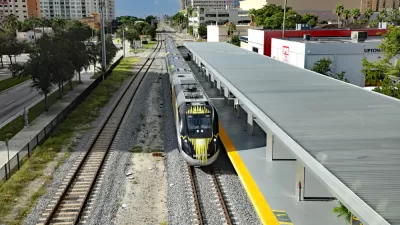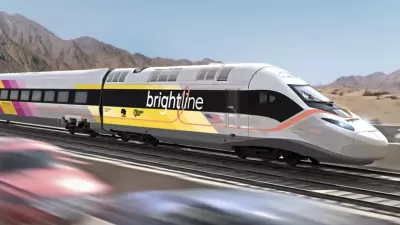Stimulus funds directed at high speed rail projects have inspired a flood of lobbying efforts across the country, according to this analysis from the Center for Public Integrity.
"[A]fter millions and millions of dollars spent studying, planning, and mostly falling short, the American incarnation of high-speed passenger rail is but a single line that travels from Washington to Boston at an average speed of under 80 miles per hour.
Now, though, the Obama administration is looking to change all that, starting with $8 billion in federal stimulus money to be awarded starting this winter. Equally captivated, Congress is considering adding as much as $4 billion more in next year's budget. The House Transportation and Infrastructure Committee chairman, James Oberstar, a Minnesota Democrat, is talking $50 billion after that.
That helps explain the U.S. High Speed Rail Association, which didn't even exist a year ago. Actually, the group was just formed in June, and the timing is no accident. High-speed rail is Washington's latest potential bonanza, it seems, and that $8 billion dollars - just for starters - is attracting lots of attention. In fact, an examination by The Center for Public Integrity found that more than 50 public and private groups explicitly lobbied on high-speed rail policy last quarter - a three-fold increase from a year ago. Even that number fails to capture dozens of other actors likely lobbying on high-speed rail that keep their specific lobbying targets as vague as Washington does its spending plans."
FULL STORY: Washington's Newest Gravy Train: High-Speed Rail

Alabama: Trump Terminates Settlements for Black Communities Harmed By Raw Sewage
Trump deemed the landmark civil rights agreement “illegal DEI and environmental justice policy.”

Study: Maui’s Plan to Convert Vacation Rentals to Long-Term Housing Could Cause Nearly $1 Billion Economic Loss
The plan would reduce visitor accommodation by 25% resulting in 1,900 jobs lost.

Why Should We Subsidize Public Transportation?
Many public transit agencies face financial stress due to rising costs, declining fare revenue, and declining subsidies. Transit advocates must provide a strong business case for increasing public transit funding.

Paris Bike Boom Leads to Steep Drop in Air Pollution
The French city’s air quality has improved dramatically in the past 20 years, coinciding with a growth in cycling.

Why Housing Costs More to Build in California Than in Texas
Hard costs like labor and materials combined with ‘soft’ costs such as permitting make building in the San Francisco Bay Area almost three times as costly as in Texas cities.

San Diego County Sees a Rise in Urban Coyotes
San Diego County experiences a rise in urban coyotes, as sightings become prevalent throughout its urban neighbourhoods and surrounding areas.
Urban Design for Planners 1: Software Tools
This six-course series explores essential urban design concepts using open source software and equips planners with the tools they need to participate fully in the urban design process.
Planning for Universal Design
Learn the tools for implementing Universal Design in planning regulations.
Smith Gee Studio
Alamo Area Metropolitan Planning Organization
City of Santa Clarita
Institute for Housing and Urban Development Studies (IHS)
City of Grandview
Harvard GSD Executive Education
Toledo-Lucas County Plan Commissions
Salt Lake City
NYU Wagner Graduate School of Public Service




























